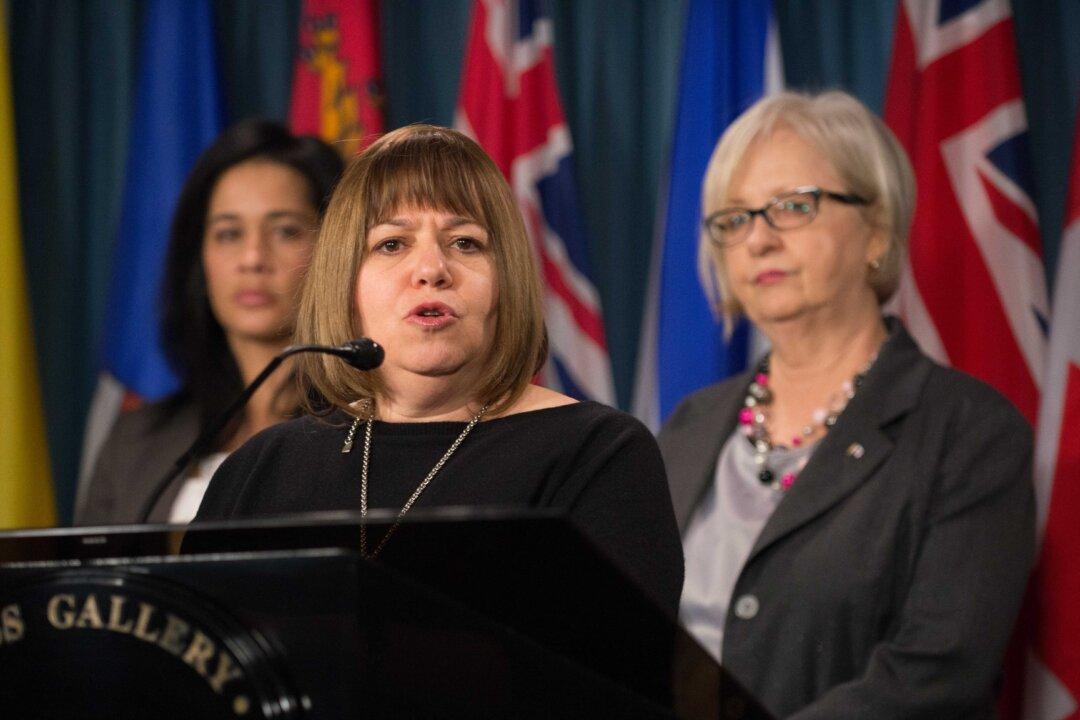PARLIAMENT HILL—Young people are having their sexuality and relationships hijacked by unregulated pornographers in California, professor and anti-pornography activist Gail Dines told reporters on Parliament Hill Wednesday.
Online pornography is—by far—the main sexual education young people get, and that has serious and widespread consequence, said Dines
That problem has connections to prostitution and sex trafficking, two matters Conservative MP Joy Smith has made it her mission to take on. The two are calling for a wider public health initiative that would address the issues in a variety of ways.
Impacts of Porn
Dines has been writing about and researching the porn industry for 20 years, a field of study that has begun churning out peer-reviewed studies that pornography has long-term and harmful impacts.
“We are in the midst of a massive social experiment and one that is reshaping the lives of young people all over the globe. Never before have children and youth had complete access to hard core porn that is based on degradation, debasement, and humiliation of women,” said Dines.
The porn kids view for free on the Internet is “not your father’s playboy,” she said.
It is often cruel, punishing, and hateful towards women—a multibillion dollar-a-year global industry that has become the main form of sex education for today’s youth.
She said porn sites get more visits each month than Netflix, Amazon, and Twitter combined.
“Over a third of the Internet is pornography.”
Boys first see porn—hardcore porn—between the ages of 11 and 13. That has a dramatic impact on how they understand relationships with women because those are the years boys develop what psychologists call the “sexual template.”
The younger they are exposed, the greater the impact. Many end up addicted to pornography, Dines said.
“Free porn is the equivalent of me standing outside a high school handing out free cigarettes and alcohol. This would not be allowed, so why is the porn industry the one industry that should not be regulated?” asked Dines.
The consequence is that boys expect similar dynamics in their real-life relationships and will pressure or coerce young girls into providing it, robbing both boys and girls of healthy relationships.
Dines said the only solution is a wide-ranging public health approach that tackles many topics, including educating young people to the impacts of pornography.
She was given a grant by the Center for Disease Control in the U.S. to devise an approach and found it would look like any other public health campaign that brings stakeholders (parents, teachers, youth workers, youth, etc) together to develop a response. It would also include mass media and public education.
“You would go out into the schools and you would develop curriculum which would help insulate children and the youth from the porn messages that are coming at them,” said Dines.
The more viewers know about the way media affect them, the better they can resist it, she said.
Porn and Prostitution
Casandra Diamond never had that opportunity. She was first exposed to pornography at five years old by her grandfather in an effort to groom her for later sexual abuse.
“I can speak to the harms done to myself of this brutal and cruel industry. When I was very young, I was taught pornographic sexuality before I had any notion of sex or what it could mean to me.”
Diamond went on to work in different capacities in the sex industry.
That scenario is common, said Dines.
On the other side of the problem, there are also studies showing that the earlier boys view the hardcore pornography that predominates the Internet, the more likely they will seek out prostitutes.
She said normal sexual relationships are too boring compared to the pornography, so they seek out prostitutes to play out those scenarios.
Many of those women are trafficked or under the control of pimps and cannot say no, said Dines. But although there are studies connecting viewing pornography with prostitution, there is not yet a documented connection between pornography and sex trafficking, Dines noted.
But 40 years of studies show beyond contention the impacts of pornography, she said.
“It is having a profound effect on the sexuality of young boys and young men.”
Porn Filter
Smith made headlines this summer when she voiced support for British PM David Cameron’s controversial porn filter. The system, implemented through Internet Service Providers, might not be the exact solution for Canada, but she agrees with it in broad principle.
Smith wants a system like that of the U.K. where Canadian Internet subscribers would have to actively disable the filter to view pornography, and only the credit card holder on the account would be able to do so.
“Parents in their homes can disable that filter so they have the freedom to watch what they want, because we do live in a democratic society,” said Smith.
As for personal computers, putting filters on them is useless, said Dines. Even a 10-year-old year old could get around them.
But inaction isn’t an option, she added.
“By not doing anything, what we are saying is that it is okay for a group of predatory capitalists in the porn industry to be the major form of sex educators—that is the reality.”
Smith is also advocating an approach to prostitution that targets the men who buy sex rather than the women that sell it. With Canada’s prostitution laws in legal limbo after they were struck down by Ontario’s highest court, she might have additional leverage in caucus to raise the issue.





